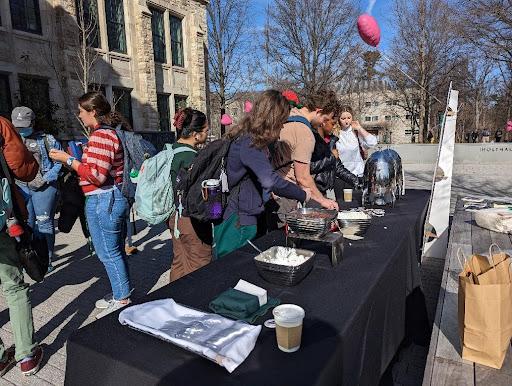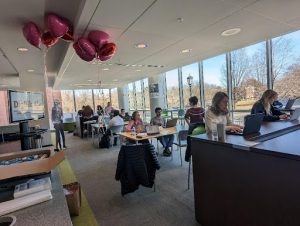Loyola honored historic abolitionist Frederick Douglass’ birthday this year with its annual “Douglass Day,” a two-part celebration co-sponsored by the English department and African and African American Studies and funded by the Center for the Humanities.
The first half of the celebration took place outside the Fernandez Center on the morning of Feb. 14, designed to raise awareness of Douglass’s birthday and the Douglass Day festivities. Red and pink heart-shaped balloons decorated the area as students played Frederick Douglass trivia and grabbed hot chocolate, marshmallows, and stickers. The Black Student Association assisted with the festivities, led by their president, Grace Murry ‘23.
“Douglass Day is, for me, a celebration of not only Frederick Douglass’s accomplishments but the accomplishments of all Black Americans. Frederick Douglass is an excellent case study for that because he worked his way out of enslavement, he fought for freedom, he was an abolitionist, and he was a suffragist. He was just a really remarkable figure, and I think it’s important that we celebrate people like him throughout our days,” Murry said.
Students were then invited to the second half of the celebration in the afternoon, a Transcribe-A-Thon of historical documents at the Loyola Notre Dame Library’s Cyber Café. As a treat, attendees also enjoyed slices of cake decorated with blue frosting and a printed photo of Douglass’ face in honor of his 205th birthday, courtesy of local bakery Confetti Cake Bar in Belvedere Square. The transcription work is part of a national project out of the University of Pennsylvania called the Colored Conventions Project, said Dr. Sondra Guttman, professor of English at Loyola.
“What they do is digitize the records of the Colored Conventions. These were political conventions held in the 19th century, African American activists getting together, trying to make changes at a national level and also a local level. They’re trying to make these records of these conventions available to researchers,” Guttman said.
Transcription is the act of typing up old, often distorted historical documents, which makes historical information more available in a digital world. Students specifically transcribed and digitized works of 19th-century activist Mary Ann Shadd Cary, an abolitionist born in Delaware. Guttman emphasized the importance of activists like Cary, who is not as well-known as Ida B. Wells and other prominent women from that era.
Guttman connected Cary’s activist efforts with those of Douglass, the focus of Douglass Day celebrations.
“Douglass was a committed feminist. It’s really appropriate that the Colored Conventions project highlights the work of Black women activists who are not as well-known as he is. So, you know, kind of indirectly through his legacy, he’s bringing these women forward into history,” Guttman said.
Murry also emphasized Loyola and Douglass’ mutual connection to Baltimore and encouraged many students to get involved with the celebration.
“Because we are in Baltimore, his history is connected to our history as well. You can see where he walked, and you can walk in the places that he walked, so I think it’s important that all Loyola students get a little bit of knowledge about Frederick Douglass,” Murray said.
Guttman aims to make Douglass Day celebrations at Loyola bigger every year. She calls Douglass one of the most important figures in both American and world history and encourages students to get involved with the project even if they were unable to attend the Transcribe-A-Thon.
“That work of transcription and identifying is really important work. And I think it’s exciting because, you know, everybody can do this, right? We can bring everybody. We can make history here. It’s not a hard thing to do, and we can be a part of it,” Guttman said.
Those who are interested in transcribing more of Mary Ann Shadd Cary’s works can visit https://douglassday.org/ to get started.
Featured Images Courtesy of Eisa Abu-Sbaih





















































































































